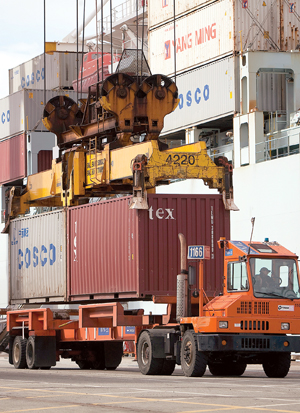2014 Volumes Up at Three Calif. Ports Despite Delays Linked to Contract Talks

This story appears in the Jan. 26 print edition of Transport Topics.
Cargo volumes and freight shipments through California ports, particularly the three largest on the West Coast, continued to climb last year despite delays and congestion linked to regional labor contract talks, the latest industry statistics showed.
Los Angeles and Long Beach, the No. 1 and No. 2 U.S. container ports, respectively, said 2014 was their third-busiest cargo handling year, with a combined total of 15.14 million 20-foot container units, up from 14.66 million in 2013.
Growth continued despite slowdowns reported during ongoing negotiations between the management’s Pacific Maritime Association and the International Longshore & Warehouse Union. Labor and management each have accused the other for slowdowns complicated by chassis shortages.
“Beginning in March, total boxes increased significantly, to numbers not seen consistently since pre-recession,” PMA spokesman Wade Gates told Transport Topics, when asked to explain how cargo volume growth and mounting congestion were related. “Compound this influx of all containers with the chassis issues and labor slowdowns, job actions, and it is entirely possible to have limited import growth and record worsening congestion.”
Union spokesman Craig Merrilees didn’t respond to requests for comment.
Statistics indicate that terminal handling overall has kept up with cargo shipment levels over the long term.
In total, Los Angeles and Long Beach reports said about 4% more vessel cargo was unloaded or loaded last year at the ports. PMA’s latest available statistics that measure freight processed in terminals through November, indicated a matching increase of about 4%.
However, the statistics confirmed late-2014 delays.
Los Angeles and Long Beach vessel cargo in November fell 0.6% year-over-year, but PMA members processed 4.4% less freight in November.
Another indicator was a Marine Exchange of Southern California report that stated 11 containerships were at anchor as of Jan. 21, five more than a week earlier.
Also, the Port of Oakland, the third-largest California port, said 2014 was a record year, including a 20% increase in December shipments.
Deutsche Bank analyst Robert Salmon noted that December cargo levels were better than the seasonal average.
“We are encouraged by December’s California import data amidst continued congestion at the West Coast ports,” his report said.
Salmon also noted that strong growth has been reported at East Coast, Gulf Coast and Canadian ports that shippers have used to broaden their options.
Meanwhile, a threatened port strike in Vancouver, Canada’s largest port, won’t occur at least until Feb. 1, said Matthew May, vice president of port trucking company BST Management Group.
The action was delayed after Canadian government officials and port operators asked for more time to address complaints by truckers. Both union and nonunion drivers believe the terms of a 2014 deal to preserve labor peace aren’t being honored, May explained.
“We are in a period of limbo until Feb. 1, when the government will announce whether it will make changes,” said May, who believes more time may be needed to resolve the complaints.

